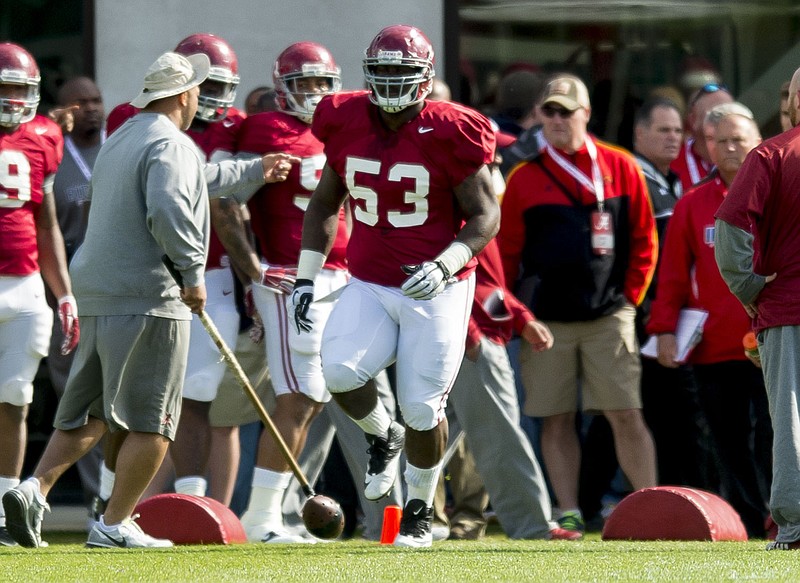The 24-year-old woman who filed charges against Alabama football player Jonathan Taylor for domestic assault recanted her story. She told Tuscaloosa police officers her wounds were self-inflicted and the damage to her apartment was from previous events.
This tangled situation just took on another layer of string and three quarts of motor oil.
"Obviously [Taylor is] concerned," Kim Stephens, Taylor's attorney, told AL.com. "He's upset as anyone would be when they've been accused of doing something they didn't do and the ramifications in light of his circumstances are huge. Not only has he been removed from the football team, he could be expelled from college, which would compromise his future. He could be prohibited from pursuing a professional career if he's good enough to do that."
There are no winners -- there never are in matters of domestic abuse or falsified matters of similar nature -- in this case.
And that's the rub. It's tough for those of us who love and follow sports. We can rationalize losses with the knowledge of wins to be had in the future. It's the ebbs and flows of competitive balance. You win some, you lose some, and sometimes it rains.
This is a sordid and sticky and confusing circumstance. And that's without the passion and pressure of being in the middle of the crosshairs of the SEC football microscope.
Whether she made up the story or is twisting it now after the fact to help Taylor is staggering, but in the moment it does not drastically change the debate.
The woman recanting her story against Taylor does not change the view that the Southeastern Conference should not be accepting violent felons on scholarship. Taylor had his chance and spent it in Athens. This is not failing a drug test or selling autographs. He's accused of a felony case of domestic assault in Georgia in a case that will return to court later this month.
Taylor has been dismissed from Alabama, so the decision about his football future is cast, but that does not alter the issue. And while his attorney questions his chances at a football future, if Taylor does not serve time from his case in Athens, he could enter the NFL's supplemental draft and roll the dice.
In fact, the latest turn only heightens future scrutiny. Whether Nick Saban would have welcomed back Taylor back to a spot across his defensive line and to a position in the spotlight as the poster boy as the king of second (and possibly even fourth) chances forever will be unknown.
And Saban -- like the rest of his colleagues -- will be put in the place of weighing the integrity of his program with the character of kids with checkered pasts.
So why let the coaches decide when their first and foremost responsibility is to win games? Make the decision for them, and while we all need second chances in this life, a violent felony is certainly a starting point for where we can draw the line for who deserves an SEC athletic scholarship.
In the end, hopefully, why limit those boundaries to just one conference saying thanks but no thanks to violent felons. Why just the SEC, as I suggested earlier this week when I wrote that college football's most powerful league should start the stand against extending second chances to those who have committed violent felonies?
In a perfect world, we could snap our fingers and take swift and decisive measures to better college athletics. In a perfect world, too, we could snap our fingers and have a Frosty. Or a Porker's barbecue sandwich.
But college sports, as we all are aware, is far from a perfect world. And knowing the process of negotiations in major college athletics, it's not unlike trying to navigate an aircraft carrier through a slalom course.
In fact, the power leagues cannot agree on something as relatively minor as a suitable early signing day for football, so expecting them as a whole to work through something as meaningful and nuanced as getting to a place where violent felons are not eligible to be scholarship athletes would be like finding a specific needle in a haystack of needles.
So here's again suggesting the SEC do this so that the pressure would mount for the other conferences to follow along. Imagine the hand-wringing from the Big Ten or the Pac-12 if the SEC jumped to the forefront on this issue, and that would be a great thing?
This could lead a total overhaul in college sports in this issue, and sadly it would have to come through the forced machination of competitive balance rather than the collaborative efforts of reform.
This latest twist with Taylor, though, also brings up the elephant in the room about the he-said, she-said nature of such cases and the potential of emotional accusations standing for actual criminal charges.
It's a difficult issue to navigate for sure, but we also believe this: If Taylor, or any SEC football player for that matter, can find serious legal trouble in the structured and protected environment of a major college scholarship athlete, well, trouble will find him anywhere.
Jay Greeson's column will appear on Page A2 on Mondays, Thursdays and Saturdays. His sports columns are scheduled for Tuesdays and Fridays. You can read his online column the "5-at-10" Monday through Friday at timesfreepress.com after 10 a.m. Contact him at jgree son@timesfreepress.com and follow him on Twitter at @jgreesontfp.
